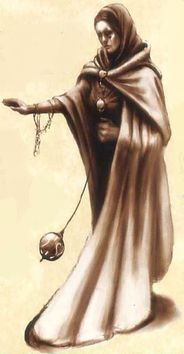
A Priestess
"One cannot do Gods' work, until man's work is complete."
- —Typical Admonishment[2a]
Priests are ordained men and women who administer to the needs of the faithful throughout the Old World. Their Gods gift them with the ability to channel small amounts of divine energy, to aid in their works. Many Priests will be assigned to a specific region or church, others are wanderers who go where they feel they can do the most good. The receptions they get are directly linked to their deity. A Priestess of Shallya is likely to be received warmly no matter where she goes, whereas a Priest of Ulric is likely to only be heartily welcomed when a great battle is in the offing.[1a]
Sacred Work
From morning prayer to evensong, a priest's day is long and laborious. After all, work is worship and idleness a mortal sin. After matins, a hundred chores await the priest, from tending the altar fires to toiling in the temple's fields or gardens.[3a]
The worst of the drudgery can be passed down to the initiates, allowing time for important tasks, such as writing sermons or preparing lessons (the education of the initiates is another responsibility). Prayer and ritual infuse everything a priest does, and he must drop everything when the temple bell summons him to worship. The the only relaxation he receives is during a few hours snatched for private study before evening devotions.[3a]
Sometimes a priest is allowed to escape the rigours of temple life to wander among his parishioners, offering prayers, guidance, and arbitrating their disputes. Bringing the god's blessing to the community is an important function.[3a]
On feast days, worshippers flock to the temple to partake in the sacred rites and sermons, and the priests must tend to their spiritual needs. A priest should always remember that he is a servant not only of his god, but also of his congregation.[3a]
Non-Human Priests
There are differences enough between the Humans, who claim mastery of the Old World, and the other races with whom they share it. There's the issue of physiology (no one would ever confuse a Dwarf for a Human), culture (has anyone met a Halfling who was not obsessed with pies?), and personalities. These are minor differences, trifles really. And, all differences aside, the four great peoples of the Empire are all united against common enemies: the Greenskin menace, the hordes of Chaos, and of course the vile Skaven. But between conflicts, these differences can be exacerbated.[2b]
Naturally, the one difference that none of the Old World races seem to be able to reconcile is their differing views on the Gods. Whilst Humans are content to leave matters of faith to the wise and the blessed, the other races have no need of such intermediaries. The role of religion as Humans view it is utterly foreign to the Elves, Dwarfs, and Halflings, even though in many respects the deities can and do overlap.[2b]
Concerning Dwarfs
Dwarfs, of course, have their own perspective on the matter of religion. As they cannot work magic of any kind, excepting their mastery of runes of course, Dwarfs do not become priests in the conventional sense. Certainly, there are plenty of Dwarfs, called Lorekeepers, who bless the babies, recount the tales of their ancestors, and advise their leaders in times of war, but the very idea that Dwarfs can channel the power of the Gods directly is utter nonsense (despite heretical claims to the contrary). It is important to remember that the Dwarfs view their ancestors as divine entities. They receive insight from the deeds and actions of those who came before, which is why it is so vital to Dwarfs to record the heroic acts that bring them glory and the treacherous betrayals that lay them low, for it is in these events that the divine speaks.[2b] Dwarfs also have less of a need for a priesthood because they view their Ancestor Gods as deities to be emulated, rather than to be appeased.[4a]
Concerning Elves
Many of the beings that make up the Elven Pantheon are direct antecedents to those still venerated in the Empire today.[2b] In fact, some Elven theologians contend that their own pantheon is the only true one, and that humans are worshipping aspects of facsimiles.[4a] However, the Elves claim they are in direct communication with their divine patrons, sharing a constant mystical link with their Gods. In a sense, all Elves act as priests, directly communing with the spirit that binds their society and race.[2b]
The Elven gods do not manifest themselves in the form of miracles or petty magic, as the Human gods do. Instead, the elves view all magic as a blessing from the gods. Thus, Elven priests are also spellcasters. A priest of Kurnous might specialize in Ghyran, while a priest of Asuryan would be adept at Aqshy or Hysh.[4a]
Concerning Halflings
Of the four major races, Halflings are the most irreverent. Setting aside the fact that Halflings have no talent for magic, the small folk are so completely unsuited to the idea of venerating anything that to even broach the topic to them would result in endless gales of laughter, perhaps followed by a proper robbery to teach the uncultured fool a good lesson. The Halflings do have their Gods, certainly, but no Halfling could be bothered to commit himself to daily and nightly prostration in the name of anyone, let alone some invisible presence that does nothing but sit around and eat and have dalliances with its siblings. When a pious mood does settle on Halflings, a festival results, and a few locals are selected to officiate the affair, being bribed heavily not to get overly drunk so that they may maintain at least the appearance of ceremony.[2b]
